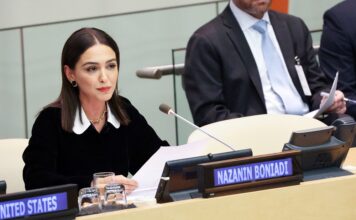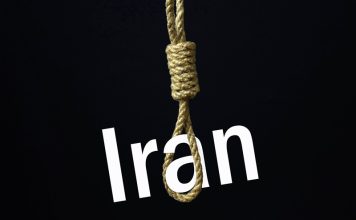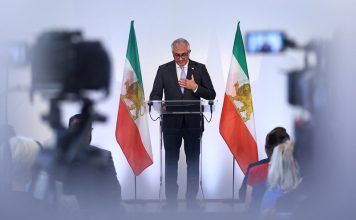A judge in Iran has told the German-Iranian Nahid Taghavi, who is being detained in Tehran’s Evin prison, that her case cannot go to court unless she confirms the charges brought against her, and that only “trusted lawyers” can access prisoners’ files. The judge’s demands have been condemned by a German parliamentarian.
Taghavi, a 66-year-old dual national from Cologne, was arrested on Oct. 16 in Tehran and placed in Section 2A of Evin prison, a block which is overseen by Iran’s Revolutionary Guards. She spent several months in solitary confinement without charge or visitation rights, and was denied medication for her high blood pressure.
Taghavi’s daughter, Mariam Claren, issued a written statement on Jan. 27 containing comments from Heribert Hirte — a member of the German parliament from the state of North Rhine-Westphalia who is overseeing Ms. Taghavi’s case. Hirte said that asking the mother of one to confirm the charges against her as a precondition to her trial was like forcing an admission of guilt, and that the use of predetermined lawyers in court undermined the right to a fair trial.
“With these two demands, the Iranian authorities and those responsible in Evin Prison are clearly violating international legal standards, such as the Universal Declaration of Human Rights or the International Covenant for Civil and Political Rights, which Iran has also signed,” Hirte was quoted as saying.
In an interview with Kayhan Life, Claren said that her uncles had travelled to Evin prison on Jan. 24 to see their sister.
“My uncles told me they arrived at the prison and applied a lot of pressure on officials. They explained that it was the 100th day of Nahid’s detention and they had not been able to visit her since her arrest,” she said. “They also asked officials why she did not have access to a lawyer and it was at that point that my uncles could finally see her.”
Claren said her uncles were taken to an interrogation room in Section 2A. They “sat down in the room with a prison official, and then my mother came in blindfolded. A guard then removed the blindfold and she and my uncles spoke through an intercom system with telephones separated by a glass pane. My mother was not allowed to tell them anything about her charges.”
During the half-hour visit, “my uncles brought my mother up to date with the news: that Donald Trump was not the U.S. president anymore, and all the latest political developments. They told her that I was working very hard to raise the campaign for her release, and that the German government was involved. And then the prison guard told them the visit was over.”
According to Claren, her mother has not been allowed to leave Section 2A of the prison and join the other female inmates in the women’s ward — which has a kitchen, books and the opportunity to talk to other women — because she has refused to confirm the charges brought against her.
An increase in the number of dual nationals being arrested in Iran in recent years has been criticized by human rights activists, who say that Iran’s government is arbitrarily detaining dual nationals to secure political and diplomatic concessions. Iran has repeatedly denied the accusation.
Meanwhile, Iran Human Rights Monitor (IHRM) published its annual report on Jan. 24. The report examines Iran’s human rights record in 2020, and focuses on the treatment of prisoners and the Iranian government’s crackdown on protestors.
The human rights watchdog found that the ill treatment of prisoners was widespread in Iran’s prisons and included torture, denial of due process and the withholding of medication to extract confessions.
“The Iranian regime breached its obligations based on international covenants on the right to life and on the health of prisoners,” said the report. “It brought tremendous pressure on prisoners. Prisoners of conscience and political prisoners underwent increasing pressure last year and were harassed, mistreated and tortured in prisons.”
The report also contained information taken from reports produced by international human rights organizations, including research by Amnesty International published in September which found that Iran’s police, intelligence Intelligence services, and prison authorities “had committed a collection of ‘shocking’ human rights abuses in complicity with judges and prosecutors.”
IHRM’s report recommends the creation of an international fact-finding delegation to visit Iran’s prisons and political prisoners, and calls for documented human rights violations to be sent to the UN Security Council.










